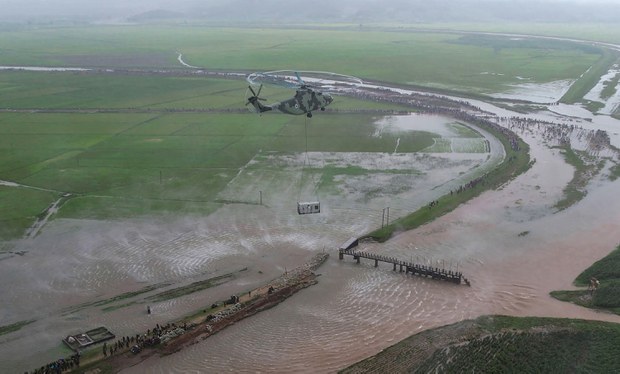Violent crime is rising in North Korea amid food shortages
Share

A North Korean helicopter flies over an area flooded by Tropical Storm Khanun in Ogye-ri, Kangwon province, in this undated photo released from North Korea’s official Korean Central News Agency (KCNA) on Aug. 14, 2023.
Murder and other violent crimes are on the rise in North Korea amid spreading hunger, but authorities have had little success in stemming the violence, residents in the country say.
Most North Koreans are struggling to survive and get food on their tables amid poor harvests and a weak economy still recovering from COVID-19 shutdowns, and sources say the pressures have led to an uptick in weapons-related offenses.
“Judicial authorities are strengthening controls by mobilizing special riot police, inspection teams, and police officers to crack down on residents’ passage at night, but criminal acts are not decreasing,” said a resident of North Hamgyong province who, like others interviewed by RFA Korean for this report, spoke on condition of anonymity citing security concerns.
“Last month, while staying at a friend’s house to earn some money in Kyongsong county, a man stabbed the friend in the stomach with a knife because the friend asked him to pay for lodging and meals,” he said. “Cases of injuring people with weapons like this are increasing recently.”
Intelligence collected by South Korean authorities indicate crime is rising north of the border and starvation is spreading.
In May, the country’s National Intelligence Service reported to the National Assembly Intelligence Committee that violent crimes in North Korea had tripled compared to the same period last year, while the country’s suicide rate increased by 40%.
South Korea’s National Intelligence Service said last week that the number of people who died of starvation in North Korea from January to July this year more than doubled compared to the average over the past five years as the food situation in North Korea worsened.
In another incident, earlier this month, a man stabbed someone to death when he was caught trying to steal a cellphone from someone who was drunk and sleeping in a park, the resident said.
“The reason why the number of these cases – murder using a weapon after a trivial argument – is increasing recently is that life is becoming more difficult day by day,” he said. “The difficulties have led to emotional outbursts. Now, residents are constantly anxious and reluctant to go out, especially when it gets dark.”
The local social security department has mobilized special riot police and random patrols, both day and night, “to devise measures to prevent incidents, including criminal acts, in advance,” the source said, “but violent criminal acts are not decreasing.”
The resident said that the Workers’ Party Central Committee has ordered judicial institutions to deal with the problem, but noted that doing so had become increasingly challenging “because people’s personalities have become very sensitive due to difficult living conditions.”
Even schools are unsafe
A resident of Ryanggang province, who declined to be named, told RFA that the local populace has also become fearful of violent crime there amid a spate of attacks.
“A few days ago, a person who was arguing over a trivial matter on the road took out a knife he had already been carrying and stabbed another person’s leg and body, causing injuries,” he said. “There are so many criminal acts involving weapons that people are afraid to even speak face to face.”
The source added that violent crimes are also occurring at schools, leading staff to conduct inspections of students’ bags and other belongings.
“But these projects are only temporary measures, and there is a limit to eliminating [the crimes], no matter how much the judicial authorities try to control them,” he said.
Translated by Claire Shinyoung Oh Lee. Edited by Joshua Lipes and Malcolm Foster.







